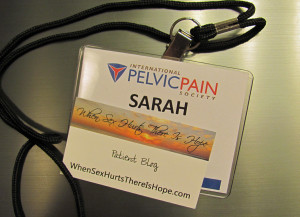I recently had the privilege of joining an amazing group of practitioners at the International Pelvic Pain Society’s 2015 Annual Meeting in San Diego. There is so much I want to share about the great information I heard and the remarkable people I met, but mostly I want to share about the hope that I was filled with. If you knew all that was being done to bring healing for chronic pelvic pain, you would be filled with hope too.
IPPS stands for the International Pelvic Pain Society (and #IPPS15 was the hashtag used during the conference if you want to catch some of the commentary that was posted on social media), but I’m going to use those same letters in my attempt to share some of why you should be encouraged to have this group of people fighting for your wellbeing.
I: Intelligent
Probably the first thing that struck me at the conference was the level of intelligence being represented. The presenters were astounding. I couldn’t count their degrees or the number of initials after their names (MD, PhD, DPT, and a bunch of others that I don’t know what they mean). As they discussed their research and other topics I was truly in awe. One example was experts in the neurological aspects of pain discussing how the brain interprets pain signals, including how chronic pain is processed very differently (even using different parts of the brain compared to acute pain).
 And it was not just the speakers exhibiting this intelligence, but also the attendees. As I looked around the room I saw so many of the pelvic pain greats—people like Dr. Irwin Goldstein and Dr. Echenberg, physical therapists like Amy Stein and Stephanie Prendergast, just to name a few. At least half of the attendees were physical therapists, and they were joined by doctors, nurse practitioners, researchers (and one blogger I might add). Those participating in the sessions not only understood what was being presented, but also had their own experiences, theories, and proven methods.*
And it was not just the speakers exhibiting this intelligence, but also the attendees. As I looked around the room I saw so many of the pelvic pain greats—people like Dr. Irwin Goldstein and Dr. Echenberg, physical therapists like Amy Stein and Stephanie Prendergast, just to name a few. At least half of the attendees were physical therapists, and they were joined by doctors, nurse practitioners, researchers (and one blogger I might add). Those participating in the sessions not only understood what was being presented, but also had their own experiences, theories, and proven methods.*
P: Passionate
It was very clear how truly passionate everyone was about finding and providing healing for chronic pelvic pain. This was true for both speakers and attendees alike, both of which traveled from all over the continent such as New York and Canada. Their passion came out in the discussions between sessions and the round table lunches dedicated to specific topics. I could hear it in the questions to the speakers as they brought up situations they see in their own clinics and how to help their patients.
Some IPPS members also submitted posters explaining various research projects and discoveries. One doctor, Laura Payne, who was chosen to present her findings at the conference discussed the relationship between menstrual pain and overall pain tolerance. Her team studied pain tolerance between young women who experience painful menstruation versus those without pain during menstruation. They found that those with painful menstruation had a lower pain tolerance or were more sensitive to other types of pain. (They are still processing their data to determine what other information might help guide future treatments.)
P: Purposeful
It was clear that the conference and the organization are very focused on their purpose. Even their web address, pelvicpain.org, makes their purpose clear. Their mission statement, outlines two primary objectives (I’m especially a fan of their second objective): 1) To educate health care professionals how to diagnose and manage chronic pelvic pain, thereby changing the lives of patients worldwide, and 2) To bring hope to men and women who suffer from chronic pelvic pain by significantly raising public awareness and impacting individual lives.
This purpose was definitely laid out through their choice of speakers and topics. The conference seemed to cover every aspect of care from improving research methods to cutting edge discoveries in chronic pain and pelvic pain conditions. Speakers discussed how to better serve patients through proven clinical models and new treatment methods. I was especially impressed to see the holistic perspective that was expressed, not leaving out the valuable aspects of nutrition, exercise and mindfulness-based techniques. Entire sessions were dedicated to educating attendees on how and why these aspects promote healing, as well as practical ways to help their patients.
S: Sexy
This year IPPS dedicated an entire extra day of the conference focused on sexual health. While many medical establishments skirt the topic of sexual issues, I was grateful to see the importance placed upon helping pelvic pain sufferers improve their sexual health and function. Many of the attendees stayed for this extra session which emphasized the need for practitioners to be comfortable asking their patients about their sexual health. One of the speakers underlined this point by quoting statistics such as 73% of patients prefer their health care provider bring up the topic yet 70% of clinicians wait for patients to talk about sex.
In addition to the importance of being comfortable discussing sexual topics and validating their patients, the session covered common sexual health disorders and health conditions that frequently affect sexual health. The speakers discussed how sexuality involves all aspects of our experience, demonstrating the bio-psycho-social approach by covering an array of topics. They provided practical tips for patients like using props to change positions (especially important for patients with pelvic floor muscle dysfunctions) and gave a detailed explanation of a four-dimensional approach to exploring each patient’s sexual story. I hope to dedicate a future post to this topic specifically because I believe that this deliberate process of walking through the mind, body, heart (or emotions) and spirit can be a significant help to those suffering from painful sex.
Overall I was very impressed and encouraged by the Annual IPPS meeting. I hope they will expand their audience in the future to include patients so that other pelvic pain sufferers can gain valuable knowledge and, most importantly, hope. In the meantime I will do my best to share what I learned so that you too can know that when sex hurts, IPPS spells hope!
*I have to admit that there was quite a bit of terminology used that I am not personally familiar with. However, even though I wasn’t able to understand everything discussed the speakers used enough clear language that I always felt like I grasped the main points.


Yay! Love this post. I think it’s great that IPPS did a good job of addressing sexual health this year.
If you are looking for a conference with expert information that also welcomes patients, the Alliance for Pelvic Pain is stepping in to fill that role. They will be having an educational retreat solely for patients in May 2016 in New York state. More info at http://www.allianceforpelvicpain.com. 🙂